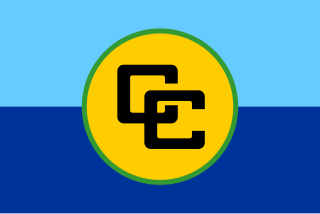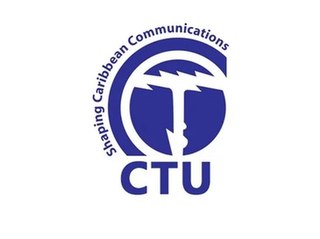
The Caribbean Community is an intergovernmental organisation that is a political and economic union of 15 member states and five associated members throughout the Americas, The Caribbean and Atlantic Ocean. It has the primary objective to promote economic integration and cooperation among its members, ensure that the benefits of integration are equitably shared, and coordinate foreign policy. The organisation was established in 1973, by its four founding members signing the Treaty of Chaguaramas. Its primary activities involve:
The Caribbean Examinations Council (CXC) is an examination board in the Caribbean. It was established in 1972 under agreement by the participating governments in the Caribbean Community to conduct such examinations as it may think appropriate and award certificates and diplomas on the results of any such examinations so conducted. The council is empowered to regulate the conduct of any such examinations and prescribe the qualification requirements of candidates and the fees payable by them. It is now an examining body that provides educational certifications in 16 English-speaking Commonwealth Caribbean countries and territories and has replaced the General Certificate of Education (GCE) examinations used by England and some other members of the Commonwealth. The CXC is an institution of the Caribbean Community (CARICOM); it was recognised as an Associate Institution of the Community in the 1973 treaty that created the Caribbean Community. Members of the council are drawn from the 16 territories and the region's two universities, the University of Guyana and the University of the West Indies.
The following is a list of heads of government of the members states of CARICOM:

The Caribbean Institute for Meteorology and Hydrology was established in 1967 by the member states, all current and ex-British colonies, of the Caribbean Meteorological Organisation (CMO). It was amalgamated with the Caribbean Operational Hydrological Institute (COHI) in the mid-1980s to form the Caribbean Institute for Meteorology and Hydrology (CIMH), but the name was only officially changed in September 1999 to reflect the dual role of the institute. Responsibility for the operation of the institute, which is located in Barbados, rests with the sixteen Commonwealth governments which comprise the CMO.
The Caribbean-Canada Trade Agreement known as ("CARIBCAN") is a Canadian government programme established under the Customs Tariff Act, in 1986 by the Parliament of Canada. The agreement was created to promote trade, investment and provide industrial cooperation through the preferential access of duty-free goods from the countries of the Commonwealth-Caribbean to the Canadian market.

The Regional Security System (RSS) is an international agreement for the defence and security of the eastern Caribbean region with future expansion planned with South America.

The Caribbean Free Trade Association (CARIFTA) was an English-speaking economic trade organisation. It organised on 1 May 1968, to provide a continued economic linkage between the English-speaking countries of the Caribbean. The agreements establishing it came following the dissolution of the West Indies Federation, which lasted from 1958 to 1962.
The Caribbean Union of Teachers (CUT) is a federation of teaching trade unions in the Caribbean. Its affiliated unions are:
The 1992 Caribbean Cup was the fourth edition of the Caribbean Cup, the football championship of the Caribbean, one of the CONCACAF zones. The final stage was hosted by Trinidad and Tobago.
The Caribbean Tourism Organization's main objective is the development of sustainable tourism for the economic and social benefit of Caribbean people.
The 1997 Caribbean Cup was the ninth edition of the Caribbean Cup hosted by Antigua and Barbuda and Saint Kitts and Nevis.

The CARICOM passport is a passport document issued by the 15 member states of the Caribbean Community (CARICOM) for their citizens. It can be used both for intra-regional and international travel. The passport was created to facilitate intra-region travel; however, citizens of the OECS that are citizens from Antigua and Barbuda, Dominica, Grenada, St. Kitts and Nevis, Saint Lucia, Guyana and St. Vincent and the Grenadines may use a member-state issued drivers licence, national identification card, voters registration card or social security card for travel within the OECS area.
The nation of Barbados has been a supporter of the Caribbean Community (CARICOM). Barbados was one of the four founding members in 1973 which then along with Guyana, Jamaica, and Trinidad and Tobago moved to establish the organization then known as the Caribbean Community and Common Market. This new organization became a successor to the Caribbean Free Trade Association (CARIFTA) of which Barbados was also a member.

The Partnership for Prosperity and Security in the Caribbean (PPS) is a regional-level dialogue with the stated purpose of providing greater cooperation on security and economic issues. The Partnership was founded in Bridgetown, Barbados on March 10, 1997 by the Governments of the United States of America, Antigua and Barbuda, the Commonwealth of The Bahamas, Barbados, Belize, the Commonwealth of Dominica, the Dominican Republic, Grenada, the Co-operative Republic of Guyana, the Republic of Haiti, Jamaica, the Federation of St. Kitts and Nevis, Saint Lucia, St. Vincent and the Grenadines, the Republic of Suriname and the Republic of Trinidad and Tobago.

The Caribbean Link for Guiding is a consortium of 21 Girl Guide Associations from throughout the Caribbean. These include associations from independent countries as well as from British Overseas Territories, coordinated by Girlguiding UK. It was created in 1958.
The Caribbean Agricultural Research and Development Institute (CARDI) carries out research and development for agriculture in the Caribbean region. Its headquarters are on the campus of the University of the West Indies (UWI), at St. Augustine in Trinidad and Tobago and it also has national offices throughout the region.
The Caribbean Farmers Network (CaFAN) was formed in 2004 following exploratory discussions amongst farmer organizations in 2002. It is a regional network of Farmers' Associations and Non-governmental organizations in the Caribbean, with its headquarters in Saint Vincent and the Grenadines. Members of CaFAN presently consist of farmer associations from Antigua and Barbuda, Barbados, Bahamas, Belize, Dominica, Grenada, Guyana, Jamaica, St Kitts/Nevis; St Lucia, Saint Vincent and the Grenadines, Trinidad and Tobago and Suriname.
The Dominica national football team represents Dominica in international football under the control of the Dominica Football Association (DFA). Although a Dominica representative team had played previously, the football association was founded in 1970. It became fully affiliated to FIFA and CONCACAF in 1994.
The Saint Lucia national football team represents Saint Lucia in international football under the control of the Saint Lucia Football Association (SLFA). Although a Saint Lucia representative team had played previously, the football association was founded in 1979. It became fully affiliated to CONCACAF in 1986 and joined FIFA two years later.

The Caribbean Telecommunications Union (CTU) is an intergovernmental organization established by CARICOM in 1989, to facilitate development of the telecommunications sector in the Caribbean.






